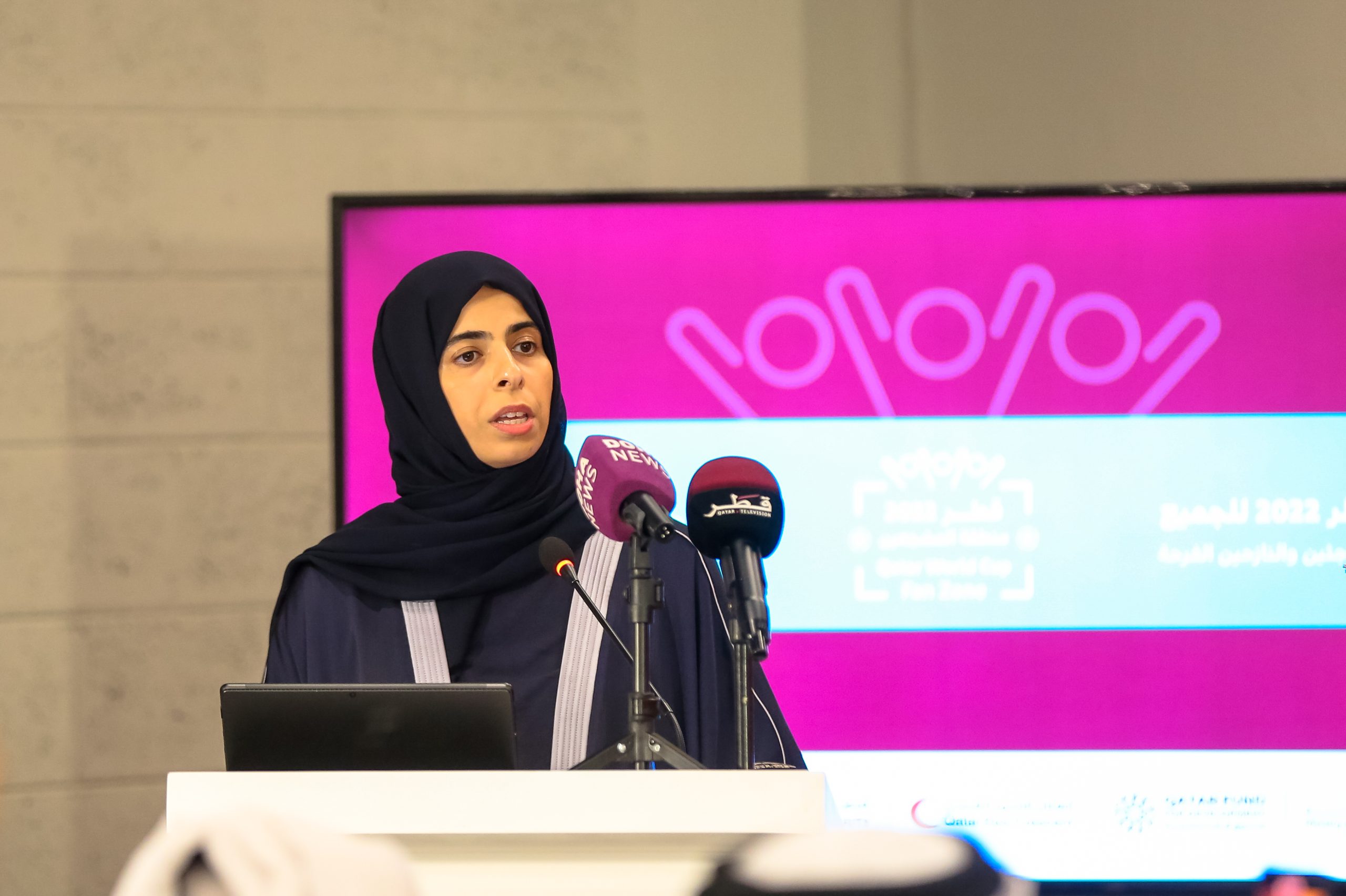Several entities in the Gulf state have teamed up to spread the World Cup joy among displaced persons and refugees in various countries.
Palestine will remain present in Qatar’s “conscience” throughout the 2022 FIFA World Cup, the Gulf state’s Assistant Foreign Minister Lolwah Al-Khater told press in Doha, on Friday.
“We expect to celebrate [the World Cup] with thousands of our brothers and sisters from Palestine and we affirm here that their cause and our just cause in Palestine will always remain present in our conscience,” Al-Khater said while taking aim at crimes committed by the Israeli occupation.
The Qatari diplomat’s statements came during a press conference with Qatar Charity and the Qatar Red Crescent Society (QRCS), that saw the launch of an initiative providing refugees and displaced people with a glimpse of the World Cup experience.
Announced just two days ahead of the region’s first World Cup, the initiative includes setting up fan zones with large screens for the targeted communities, ensuring a “Qatar 2022 for all”.
Some of the refugees that will get access to the matches through the large screens include the community at Jordan’s Zaatari camp, a place that has long served as a stark reminder for the ongoing Syrian refugee crisis.
Other countries include Sudan, Syria, Bangladesh, Somalia and Kenya.
The Qatari humanitarian entities also announced several activities throughout the tournament in an effort to alleviate the suffering of the thousands of displaced populations and refugees.
The Supreme Committee for Delivery and Legacy (SC) and beIN Sports are also among the key partners of the humanitarian initiative.
Al Khater’s remarks on the Palestinian cause further confirmed the Gulf state’s unwavering support to Palestine. Qatar has repeatedly ruled out normalisation with Israel for its ongoing crimes against Palestinians.
In September, Qatar’s Amir Sheikh Tamim bin Hamad Al Thani slammed Israel’s occupation of Palestine in a major new interview with French outlet Le Point.
“Every country has the right to establish relations with the countries it wants. But what is normalisation with Israel? Seriously, are things normal in Israel? No!” Sheikh Tamim told France’s Le Point.
More recently, Qatar has all-out refused for Israel to operate a temporary consulate in Doha during the World Cup.
Instead, Israeli citizens will be provided consular services via a privately-operated international travel company located in an office building.
Islamophobia and racism
Addressing the press, Al Khater expressed Qatar’s solidarity with refugees and displaced persons, stressing its role in prioritising diplomacy and mediation at the top of its foreign policy.
She also took aim at the continuous rise of Islamophobia against those in the Middle East and speech portraying the region in a negative light.
“The peoples of our region have been wronged when they have become victims of successive crises, armed conflicts, raging conflicts, and an increasing escalation of the Islamophobic rhetoric,” said Al Khater.
The Qatari diplomat added that the region has faced “malicious campaigns based on double standards, for which innocent people paid the price of displacement, asylum and cruel treatment.”
Her remarks also came amid an anti-Qatar campaign driven by the west since 2010, when the Gulf state made history as the first Arab country to win the bid to host the World Cup.
Officials from Qatar and the region have repeatedly pointed to “racist” motives behind the campaigns, which has included various headlines that have been denounced by authorities in Doha as ‘misleading’ and ‘sensationalist’.
Earlier this month, Nasser Al-Khater, Chief Executive Officer of Qatar 2022, said that Europe has long seen the Arab world as a conflict-ridden region.
Meanwhile, Qatar’s Foreign Minister Sheikh Mohammed bin Abdulrahman Al Thani said he came across commentary that accused Qatar of not being “intellectually and culturally ready” to host the World Cup.
“Is such racism acceptable in Europe in the 21st century? Football belongs to everyone. It is not reserved for a club of elites. Four hundred and fifty million Arabs are delighted that the World Cup is finally being held in their region,” Sheikh Mohammed told France’s Le Monde earlier this month.







